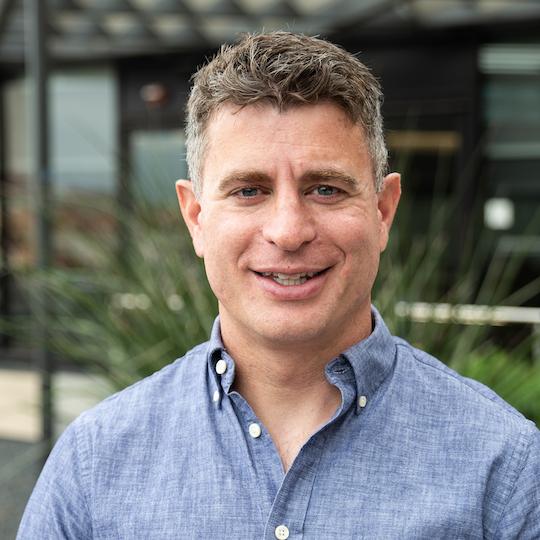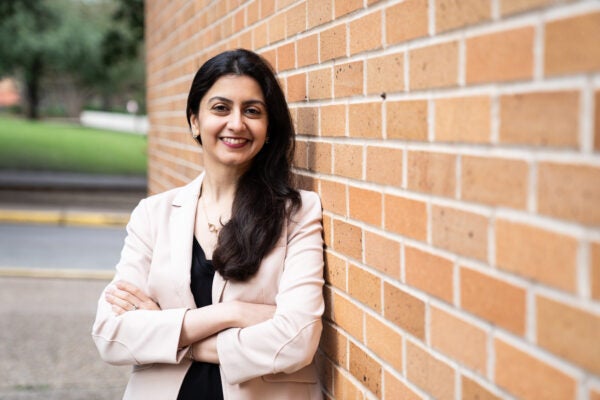Toward a ‘Human-Centered’ Accounting Course
Student discussion drives curriculum for Teaching Fellow Badolato’s innovative class

Accounting Patrick Badolato
With more than 240 courses taught since his arrival at the McCombs School of Business in 2010, Patrick Badolato once set a record for teaching the most sections in a single year — 21. Now he is funneling that energy toward transforming one of the school’s foundational undergraduate courses.
An associate professor of instruction in accounting, he has taught in every McCombs program: executive, full-time, evening, Dallas, and Houston MBA programs, as well as the MPA, M.S., and MSTC graduate programs and undergraduate BBA program.
He says he simply loves teaching: “I sincerely enjoy the act of teaching, which I see as a combination of guiding others through learning, but also learning a ton from my students.”
What he hates is siloed education. No place is that more clear than in his role in the evolution of ACC 311, Intro to Financial Accounting. Traditionally taught with emphasis on bookkeeping and the tools of accounting, the required course has been viewed by some of the 1,000 undergraduates who take it each year as a rite of passage to be endured.
Not anymore. Badolato is leading the rollout of a cross-pollinated and applied approach, targeting more on discussion and understanding of real-world financial information. It follows the approach he prefers for all of his teaching.
“The vast majority of our students will never do bookkeeping or accounting software tasks outside of the class, but nearly all will make business decisions with financial information,” he says.
Fellows program supports innovative restructure of ACC 311
As a 2024-2025 Teaching Fellow, Badolato sees broad opportunities beyond his own classes: “It’s an avenue to engage more.”
Support from leadership opened the door for Badolato to redesign the ACC 311 core curriculum to become more relatable and interdisciplinary. A pilot course was successful, and he coached two colleagues through teaching a second implementation.
During his second year as a fellow, during Fall 2025, the curriculum will scale up to 18 sections taught by seven other faculty members.
The new approach includes:
- Fresh materials written by Badolato and McCombs colleagues.
- Real-world case studies, based on familiar businesses such as Starbucks.
- De-emphasis on exams, which yield more stress and less learning.
- More recurring assignments, due before most classes.
- Emphasis on classroom conversations.
“We’re bringing forward the big picture of accounting instead of the tedious, detail stuff that was pushing people away. Why not start with the broad, big-tent policy early, in the first accounting class?”
— Patrick Badolato, McCombs Teaching Fellow; 2024-2025, 2025-2026
Students recognize value of new approach
Results of early student surveys are extremely positive, Badolato says. “The samples are small, but in the beginning, almost no one is interested in accounting. At the end of the course, there is a statistical improvement.” He adds that the big test will be after the launch of 18 sections this fall.
One student said they considered dropping out of school until being drawn into discussions in the new version of the class, where they found connection and community.
Another student said: “I have spoken to students within that class that both loved and hated accounting, who were good and bad at math, but the general consensus was that regardless of your opinion on the subject matter, his style of teaching was by far the most engaging material.”
There have been some bumps along the way, as some dislike his personal rule: no technology in the classroom.
“I’m creating a more human-centered classroom. Students in general don’t like it at first. There’s definitely grumbling. But the feedback later is really heartwarming. Amazing,” he says about banning laptops and other devices.
“I’ve had students say that my class was the first time they heard from their classmates. The first time they participated in a discussion.”
Potential employer shows early interest
The new approach is getting noticed. Badolato says he is encouraged by a recent conversation with a representative of one of the Big Four accounting firms, a major employer of McCombs graduates.
“He was extremely enthusiastic about making this approach the norm and circulating across the firm,” Badolato says. “He said he took a class in grad school with the same perspective. But never in his whole undergrad. He sees the power of engaging early.”
Badolato believes the new ACC 311 rollout is the right approach, and so do his colleagues who oversee the Teaching Fellows program.
“I expect Patrick’s project will be a win for McCombs by encouraging talented students to continue their studies in accounting,” says Kristie Loescher, assistant dean for the Office of Instructional Innovation. “It’s also a win for students by creating a memorable learning experience, and a win for the professors by developing a teaching approach that is a joy to deliver.”
Story by Sandra Kleinsasser
About this Post
Share:


